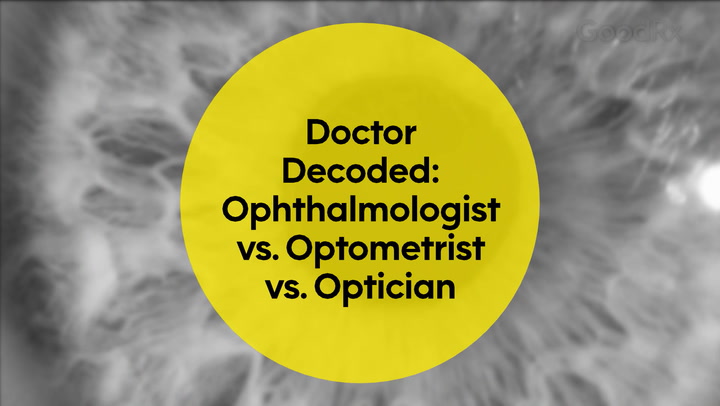
Medications to Avoid With Glaucoma: These 6 Medications May Worsen Your Symptoms
Key takeaways:
Glaucoma refers to a group of eye conditions that cause optic nerve damage and vision loss. Among other factors, certain medications may cause or worsen glaucoma symptoms.
Common medications to avoid if you have glaucoma include anticholinergics, corticosteroids, and sulfa-containing medications. Several over-the-counter (OTC) cough and cold medications can also make symptoms worse.
Make sure your ophthalmologist and pharmacist are aware of all of the prescription medications, OTC products, and dietary supplements that you take. They can help you avoid medication-related glaucoma complications.
Table of contents

Glaucoma is a relatively common eye problem that’s caused by damage to the optic nerve. This damage often stems from eye pressure, or intraocular pressure (IOP), being too high.
Not all types of glaucoma are the same, though, and each type can affect people differently. Open-angle glaucoma is the most common and usually progresses slowly. The symptoms aren’t typically noticeable right away. But, over time, the condition can lead to vision loss or blindness. On the other hand, angle-closure glaucoma often appears suddenly. And it can cause rapid vision loss, making it a medical emergency.
Managing glaucoma often involves applying prescription eye drops every day. But it’s also important to avoid certain medications that can cause or worsen glaucoma symptoms. Here, we’ll discuss six notable types of medications to avoid with glaucoma.
1. Anticholinergics
Many medications fall under the category of anticholinergics. These medications are used to treat a wide range of health conditions, ranging from nausea and asthma to an overactive bladder.
Anticholinergic medications work by stopping the activity of acetylcholine, a chemical in charge of many bodily functions. This can open up your airways, speed up your heartbeat, and help with motion sickness, among other effects. But it can also cause unintended side effects. Dry mouth, constipation, and trouble peeing are all common complaints with anticholinergics.
Anticholinergics can also cause eye-related side effects. These side effects include temporary blurred vision and even acute angle-closure glaucoma, which can be dangerous.
Listed below are several anticholinergic medications to avoid (or use with caution) if you have glaucoma.
Antihistamines
Antihistamines, which have anticholinergic effects, are commonly used to treat allergy symptoms. Some can be used for nausea relief, too. Some popular over-the-counter (OTC) antihistamines are diphenhydramine (Benadryl), loratadine (Claritin), and cetirizine (Zyrtec).
Antihistamines can cause your pupils to dilate, or open up. This can lead to fluid buildup in the back of your eye, putting added pressure on your optic nerve. This can be especially harmful by causing a sudden increase in IOP.
Because of this risk, you should use caution when taking antihistamines if you have glaucoma. Specifically, you should only take them under your ophthalmologist’s supervision.
Antidepressants
Certain antidepressants have anticholinergic traits that can increase IOP. Examples include tricyclic antidepressants (TCAs), such as amitriptyline, and selective serotonin reuptake inhibitors (SSRIs) such as sertraline (Zoloft).
Ideally, other types of antidepressants should be considered if you have glaucoma. Atypical antidepressants, such as bupropion (Wellbutrin XL) and mirtazapine (Remeron), may be safer options. Based on your symptoms, your prescriber can help you find an effective antidepressant that’s safe to take with glaucoma.
Inhalers
Some inhalers for asthma and chronic obstructive pulmonary disease (COPD) contain anticholinergic medications. Ipratropium (Atrovent) and tiotropium (Spiriva) are two notable examples.
Like with other anticholinergics, the medications in these inhalers can cause pupil dilation that may increase pressure in the eyes. Your pulmonologist may recommend avoiding anticholinergic inhalers and trying an inhaled corticosteroid, such as budesonide (Pulmicort) or beclomethasone (Qvar RediHaler), instead.
Other anticholinergics
Many other medications have anticholinergic properties. This includes medications for urinary incontinence, irritable bowel syndrome, Parkinson’s disease, and more. Specific examples include:
Oxybutynin (Ditropan XL)
Dicyclomine (Bentyl)
Scopolamine (Transderm Scop)
Benztropine
Quetiapine (Seroquel)
Atropine (Isopto Atropine)
Like the previous examples, these anticholinergic medications may increase your IOP and contribute to vision problems. Your ophthalmologist can tell if you should stop taking one of these medications and if an alternative would be recommended.
Understand your risk. Learn how experts respond to the question: Is glaucoma hereditary?
Considering cannabis for glaucoma? There are a few things to keep in mind before using cannabis for glaucoma treatment.
Seeing through setbacks: Read one woman’s unique perspective on living with glaucoma and not letting vision loss hold you back.
2. Corticosteroids
Corticosteroids, such as prednisone and fluticasone propionate (Flonase), can significantly increase IOP when taken for a long period of time. This can happen with both systemic (oral or injected) and topical (eye drops or nasal sprays) corticosteroids.
As a general rule, contact your ophthalmologist before starting or stopping treatment with a corticosteroid. They can evaluate the risks. And, if needed, they can walk you through steroid tapering (lowering your steroid dosage over time) if you develop glaucoma symptoms after starting a corticosteroid.
High eye pressure related to a corticosteroid will usually resolve within a few weeks after you stop taking the medication.
3. Sulfa-containing medications
Sulfa-containing medications can sometimes worsen glaucoma symptoms. They do this by causing the inside of the eye to swell, putting added pressure on the optic nerve.
Several sulfa drugs are available. Glimepiride (Amaryl) for diabetes, sumatriptan (Imitrex) for migraines, and furosemide (Lasix) for high blood pressure are all common examples. Certain antibiotics, such as sulfamethoxazole / trimethoprim (Bactrim), also contain sulfa.
If you start taking a medication that contains sulfa, you may notice blurry vision within the first 2 weeks of treatment. Reach out to your ophthalmologist if this occurs. They may recommend a dosage adjustment or stopping treatment with the medication altogether.
4. Certain OTC cough and cold products
Many OTC cough and cold medications contain decongestants like pseudoephedrine (Sudafed) and phenylephrine (Neo-Synephrine). Oral and nasal decongestants can dilate the pupils and increase IOP.
If you have glaucoma, it’s important to check OTC product labels and try to avoid products that contain these ingredients. Decongestants are available as stand-alone products, but they’re also found in many combination products.
Your pharmacist can suggest safer alternatives, such as saline nasal rinses, to help calm down your cough and cold symptoms.
5. Blood thinners
Warfarin (Coumadin, Jantoven) and other blood thinners are designed to prevent blood clots. In turn, they lower the risk of experiencing dangerous heart-related health problems.
However, because of how they work, blood thinners can also increase the risk of accidental bleeding — including in the eye. This blood thinner side effect can lead to glaucoma complications. This is especially true during eye surgery or after an eye injury.
If you’re taking a blood thinner, factors that can increase your risk of eye bleeding include:
Older age
High blood pressure that’s not being adequately treated
Chronic kidney disease
Other eye conditions, such as macular degeneration
If you take a blood thinner, let your ophthalmologist know. They’ll likely monitor you closely to help lower the likelihood of eye complications.
6. Botox injections
In rare cases, wrinkle-reducing Botox (onabotulinumtoxinA) injections may increase IOP. This side effect is more likely when Botox — or a comparable Botox alternative — is injected near the eyes.
If you’re receiving Botox, keep a look out for:
Severe eye pain
Blurry vision
Headaches that won’t go away
Halos in your vision
If you develop any of these symptoms, it’s important to contact your ophthalmologist right away. If your symptoms feel severe, seek emergency medical care instead.
How do you treat medication-induced glaucoma complications?
If you think that a medication is triggering your glaucoma symptoms, contact your ophthalmologist as soon as possible. They can look at your medication list and see if anything could be contributing.
If needed, your ophthalmologist may recommend one or more of the following courses of action:
Stopping a medication that’s causing an issue: Your eye-related symptoms may gradually improve after stopping a medication that’s causing complications. Never stop taking a medication on your own, though. Some medications, such as heart and blood pressure medications, may be necessary for your health.
Starting a new glaucoma medication: If you use prescription eye drops to treat glaucoma, your ophthalmologist may adjust your glaucoma treatment regimen to get your symptoms under better control. They may recommend starting treatment with another medication, too.
Thinking about surgical options: Laser therapy or eye surgery may be necessary to treat high eye pressure in more serious cases.
Monitoring your condition regularly: Frequent eye exams will help your ophthalmologist manage your glaucoma. This will help them get ahead — and stay ahead — of glaucoma complications, too.
The bottom line
There are many medications to avoid with glaucoma. Anticholinergics, corticosteroids, and sulfa-containing medications can all increase intraocular pressure (IOP) and cause or worsen glaucoma symptoms. Decongestants, blood thinners, and Botox injections are also risky.
If you’re living with glaucoma, it’s a good idea to have your ophthalmologist and pharmacist review your medication list. They can check to see if you’re taking any medications that may worsen your glaucoma symptoms.
Why trust our experts?



References
Ahmad, R., et al. (2021). The ocular adverse effects of oral drugs. Australian Prescriber.
Boyd, K. (2024). Glaucoma eye drops. American Academy of Ophthalmology.
Chen, V. C. H., et al. (2017). Effects of selective serotonin reuptake inhibitors on glaucoma: A nationwide population-based study. PLoS One.
Ghossein, N., et al. (2023). Anticholinergic medications. StatPearls.
National Eye Institute. (2021). Types of glaucoma.
Wu, A., et al. (2020). A review of systemic medications that may modulate the risk of glaucoma. Eye.

















